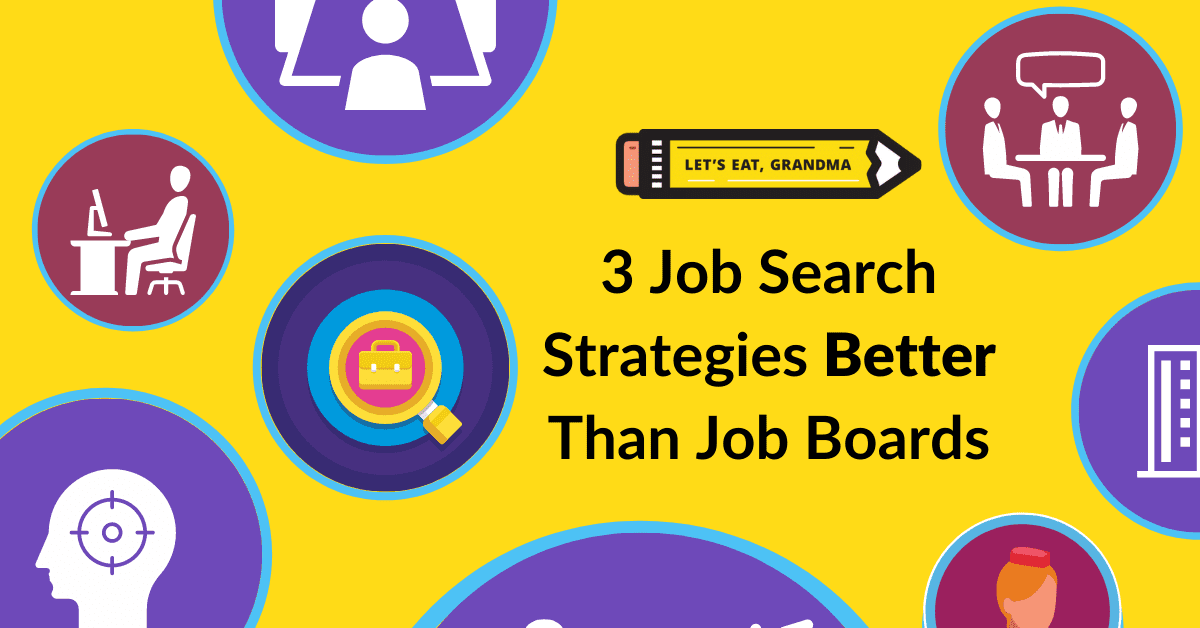Beyond Job Boards: 3 Job Search Strategies to Get Hired Faster

Looking for a new job? Try these job search strategies to get ahead.
By: Grace Mitchell | Contributor for Let’s Eat, Grandma
Did you know that when a job gets posted online, the posting attracts hundreds of applicants?
Job boards are here to stay, but throwing your resume at them hoping it’ll stick somewhere isn’t the best plan if you’re hoping to get hired quickly.
To get one thing straight: We’re not trying to demonize job boards. However, it’s much easier to land a job quickly when you view job boards as just one part of a holistic strategy rather than as your sole strategy.
Ready for more job search help?
Sign up for a free Senior Writer Resume Critique to see what's holding you back from landing interviews. One of our top professional resume writers will give you personalized feedback on the top 3 items you can improve based on our expert practices!
Beyond the Boards

Incorporating Informational interviews in your job search strategy will strengthen your professional network. Photo by Christina @ wocintechchat.com on Unsplash
Let’s step away from the board for a moment and explore three strategies to incorporate into your career transition.
1. Try authentic, strategic networking.
Networking is always thrown around as the best job search strategy – but what do people really mean by “networking,” anyway?
First of all, we want to be clear that we don’t mean throwing hundreds of business cards to the wind with reckless abandon. Effective networking requires initiative and strategy, and it might even save you some paper. Win, win.
Effective networking is about building strong relationships within your field.
Start by making a list of your target companies and roles, and finding out who you know who does that role or works for that company.
Once you establish who your connections are, ask for informational interviews to strengthen the relationship and learn more about what your connections do.
You can eventually use these same connections to get introduced to key players in the company who you can send your resume to directly, but the first step is to build relationships and set up informational interviews.
You can reach out at in-person events, or, if face-to-face isn’t an option, a reach-out email is a great way to establish or strengthen a connection. Lisa Lewis of Career Clarity suggests crafting a short, thoughtful message. She says that the goal is to refine the message so that the receiver feels only they can answer the message.
Do your research on the person you’re contacting, share information about yourself, and keep your initial ask small. After all, this is your first or maybe second contact with this person, and the goal is a long-lasting relationship.
(If you need extra assistance in crafting a great reach-out email, Let’s Eat, Grandma offers a digital guide to cold emails as part of our Accelerated Package or on its own.)
Don’t discount a relationship just because it isn’t strong yet. The goal isn’t to confirm where your relationships are already strong, but to strategically build relationships in line with your (even long term!) career goals.
You can even consider friends of friends as potential networking relationships! Recently, I was speaking to a friend who wanted to transition into the food science industry. I asked him if he knew another friend who worked for a prominent local cheesemaker, which turned out to be one of his target companies! I was able to connect them so he could learn more about the company culture and have an “in” if he applied with them.
Protip: Don’t forget to pay it forward. When you’re attentive to building connections for your connections, they’re more likely to do the same for you. You’ll also have happier connections who are closer to their career goals, and who wouldn’t want that?
2. Maximize your LinkedIn potential

The strongest job search strategies involve an active LinkedIn presence. Photo by Souvik Banerjee on Unsplash
If you build it, they will come! Your LinkedIn profile is a valuable tool that allows you to include way more information than your resume alone. It can be used as a sort of enhanced job board: You can search for jobs and then research and connect to people at that company, all on the same platform!
While recruiters and other contacts can choose to read as much or as little as they want, loading your profile with details makes it easier for them to find you whether through search engines or LinkedIn itself, and makes it more likely that you’ll strike up a connection once you do. Maybe you and your potential recruiters volunteer for the same nonprofit, share a hobby, or belong to the same religious organization. You’ll never know if you don’t mention these details!
Take the time to complete your LinkedIn profile in order to attract passive leads from recruiters. Your About section can be up to 2,600 characters long, and we suggest that you use as many of these as you need to share your unique career story and aspirations.
Ideally, you’ll tell a story engaging enough here so that recruiters want to click that “read more” arrow!
Of course, it’s not worth putting in the time if recruiters can’t see your profile, so be sure to optimize your settings so recruiters will see that you’re looking for work. You can adjust your settings in LinkedIn so that only recruiters see that you’re open to new opportunities.
(Note: LinkedIn does take steps to hide your openness from recruiters of your own company but cannot guarantee privacy 100% here.)
You can also choose to build your profile and then use LinkedIn’s advanced search to find recruiters yourself if you’d prefer to take the proactive approach. You can search for a recruiter in your specific area in your desired field and then use the same reach-out email approach discussed in #1!
3. Try volunteering and/or freelancing (especially for a new field)

Freelance work can help you get your foot in the door at the company or industry you want to work for. Photo by Malte Helmhold on Unsplash
This last option is more of a long-game strategy, but, if you’re transitioning into a new career, it can be a great way to make the connections that get you where you want to go!
Freelance work gives you the opportunity to explore new career possibilities without quitting your current job. Not only does it help you determine if you’d want to do that work 9-to-5, it also helps you build valuable connections within your desired field.
You can leverage your networking relationships from step #1 to generate freelance or contract work opportunities. Again, remember to keep initial asks small. Your connections are more likely to want you to do work for them after you’ve built a rapport.
Another valuable option is volunteering within your desired field. While this is only possible if you have the financial means to do a bit of work for free, volunteering can help you develop both the skills and connections you need to snag a lucrative job down the road.
Pulling It All Together
Now that we’ve run through the best ways to make connections within your desired industry and field, you can tackle those job boards with greater clarity and prospects. No matter your strategy, keep building those relationships—you never know where your next job may come from!
Ready for more job search help?
Sign up for a free Senior Writer Resume Critique to see what's holding you back from landing interviews. One of our top professional resume writers will give you personalized feedback on the top 3 items you can improve based on our expert practices!
